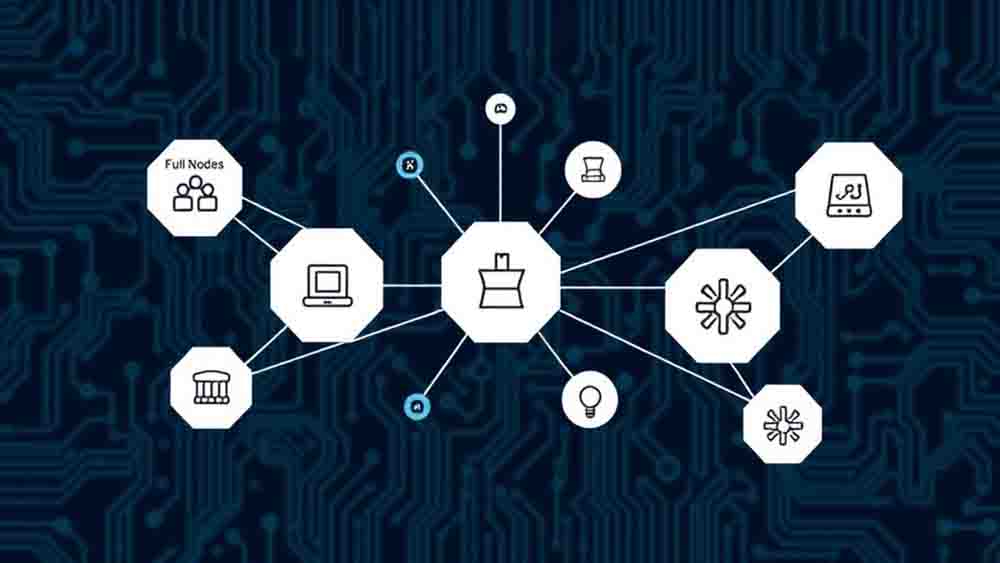Why Are Nodes Essential for Digital Ledger Networks?
Note: This post may contain affiliate links, and we may earn a commission (with No additional cost for you) if you make a purchase via our link. See our disclosure for more info. The crypto world is constantly changing. This content is for informational purposes only and not financial, legal, or professional advice So, please verify the info on the cryptocurrency provider’s websites.
Click below and listen to the podcast about this page.
As you explore digital ledger networks, you'll find that nodes are the unsung heroes of blockchain technology. You might wonder why these simple parts are so vital to the system. Nodes aren't just passive; they're vigilant guardians. They keep the network honest, secure, and decentralized. Without them, the blockchain would crumble. Trust in cryptocurrencies and other apps would vanish. But what exactly do these nodes do, and how do they maintain such a critical role in the ecosystem? The answer lies in their unique functions and the way they interact with each other.
Key Takeaways
- Nodes maintain and validate the digital ledger, ensuring decentralized data integrity across the network.
- They perform transaction validation, preventing double-spending and upholding consensus rules.
- Nodes distribute copies of the blockchain, eliminating single points of failure and enhancing network security.
- They enable real-time auditing and transparency, fostering trust among participants in the network.
- Nodes support various consensus mechanisms, allowing networks to adapt to different use cases and security requirements.
Defining Digital Ledger Nodes
Digital ledger nodes form the backbone of blockchain networks, acting as the guardians of decentralized data. These nodes are vital components that maintain and validate the integrity of the digital ledger.
When you participate in a blockchain network, you're connecting to a vast web of nodes that work together to guarantee transparency and security.
Nodes play an important role in validating transactions and reaching consensus on the state of the ledger. Each node maintains a complete copy of the blockchain, allowing for independent verification of all transactions. This decentralized approach eliminates single points of failure and enhances the network's resilience against attacks.
There are different types of nodes in blockchain networks:
- Full Nodes: These maintain a complete copy of the entire blockchain history.
- Light Nodes: They store only a subset of the data for efficiency.
The number of active nodes directly correlates with a network's stability and security. For example, Bitcoin's network boasts over 50,000 nodes as of 2024, contributing to its robust and tamper-resistant nature.
Core Functions of Blockchain Nodes
Blockchain nodes perform several core functions that are essential to the network's operation. These digital participants work tirelessly to validate transactions and maintain the entire blockchain ledger.
As a user of blockchain technology, you'll benefit from the decentralized nature of blockchain, which relies on different types of nodes to function effectively.
Full nodes play an important role in the network by storing and validating the complete blockchain history. They:
- Validate new transactions according to the network's consensus rules
- Relay verified transactions to other nodes
- Maintain consensus across the network
Light nodes, on the other hand, operate with limited resources and depend on full nodes for transaction verification. This hierarchical structure guarantees that even users with less powerful devices can participate in the network.
The consensus mechanism, facilitated by nodes, is essential for maintaining the integrity of the blockchain. Nodes work together to agree on the valid state of the ledger, preventing double-spending and other fraudulent activities.

Types of Nodes Explained
In the world of blockchain networks, you'll encounter various types of nodes, each serving distinct purposes.
Full nodes act as the backbone validators, maintaining complete copies of the blockchain and enforcing consensus rules.
Light nodes, also known as SPV nodes, function as efficient inquirers, allowing devices with limited storage to participate in the network by downloading only essential information.
Specialized nodes, such as mining nodes, master nodes, and authority nodes, operate as task-specific operators, focusing on particular functions like block creation, transaction validation, or network governance.
Full Nodes: Backbone Validators
At the core of digital ledger networks, full nodes serve as the backbone validators, guaranteeing the integrity and security of the entire system.
These nodes maintain a complete copy of the blockchain ledger, independently validating all transactions and blocks. By doing so, full nodes play an essential role in upholding network security and preventing fraudulent activities.
Full nodes are vital for decentralization, as they don't rely on any central authority to verify transactions. They ascertain that all transactions conform to the consensus rules of the blockchain, rejecting those that don't meet the necessary criteria. This process helps maintain the network's integrity and protects against potential attacks.
Operating a full node requires significant computational resources and storage capacity. However, these requirements are imperative for users and organizations seeking to engage deeply with the blockchain ecosystem.
As of 2024, Bitcoin reported over 50,000 active nodes, highlighting the importance of distributed ledger technology.
Benefits of Full Nodes:
- Enhanced network security
- Independent transaction validation
- Increased decentralization
- Protection against fraudulent activities
- Direct participation in the blockchain ecosystem
Light Nodes: Efficient Inquirers
Light nodes, also known as Simplified Payment Verification (SPV) nodes, offer a streamlined approach to blockchain interaction. These resource-efficient nodes store only block headers, making them ideal for devices with limited storage capacity. By relying on full nodes for transaction verification, light nodes can confirm transactions without downloading the entire blockchain.
Key benefits of light nodes include:
- Faster syncing and lower resource usage
- Enhanced accessibility for mobile wallets and lightweight applications
- Quick access to transaction information
Light nodes maintain the integrity of the ledger through cryptographic proofs provided by full nodes. This allows you to interact with the blockchain securely, even on devices with limited capabilities.
However, it's essential to recognize that light nodes are less secure than full nodes. They depend on others for verification and can't independently validate the entire transaction history.
Despite this trade-off, light nodes play a pivotal role in expanding blockchain accessibility. For users prioritizing speed and efficiency, light nodes offer a practical solution. They enable you to participate in the network without the resource demands of full nodes, making blockchain technology more accessible to a wider range of devices and applications.

Specialized Nodes: Task-Specific Operators
Specialized nodes serve as the task-oriented workhorses of digital ledger networks. These nodes perform specific functions to maintain the network's integrity and efficiency. While Full Nodes handle the overall blockchain management, other specialized nodes focus on distinct tasks:
- Mining Nodes: In Proof-of-Work systems, these nodes validate transactions by solving complex mathematical problems. They're rewarded with cryptocurrency for their efforts, contributing to network security.
- Light Nodes: Designed for efficiency, these nodes download only essential block headers, relying on Full Nodes for transaction verification. They're ideal for resource-constrained devices.
- Master Nodes: These nodes validate transactions and maintain records without generating new blocks. They often require significant collateral investment and play a vital role in network stability and governance.
- Authority Nodes: Found in partially centralized blockchains, these nodes are selected by managing organizations to validate transactions under proof-of-authority mechanisms.
Consensus Mechanisms and Validation
Consensus mechanisms form the backbone of digital ledger networks, ensuring that only legitimate transactions are added to the blockchain. These mechanisms, such as Proof of Work (PoW) and Proof of Stake (PoS), rely on nodes to validate transactions and maintain data integrity across the network.
In PoW networks, miner nodes compete to solve complex cryptographic puzzles, earning rewards for successfully adding new blocks. PoS networks, on the other hand, select validator nodes based on the amount of cryptocurrency they've staked. Both systems require nodes to reach agreement on the ledger's state, protecting against fraudulent transactions.
The consensus process involves:
- Nodes participating in a mempool, where signed transactions await validation
- Achieving consensus among nodes
- Including validated transactions in the next block, making them immutable
A high number of participating nodes enhances network security and resilience. This makes it extremely difficult for malicious actors to alter the blockchain, as they'd need to control the majority of nodes.
Network Security Through Decentralization
In blockchain networks, you'll find that nodes play a vital role in distributing copies of the ledger across multiple devices, effectively protecting data from manipulation.
This decentralized approach eliminates single points of failure, as the network remains intact even if individual nodes are compromised.
Distributed Data Protection
Resilience forms the cornerstone of distributed data protection in digital ledger networks. Nodes play an essential role in maintaining the integrity and security of blockchain systems. Each node holds a complete copy of the ledger, guaranteeing that data remains protected against loss or corruption. This decentralized structure enhances the network's overall security, making it considerably harder for malicious actors to compromise the system.
When you participate in a blockchain network, you're contributing to its robustness. Nodes independently validate transactions and participate in the consensus mechanism, preventing fraud and double-spending. The geographic distribution of nodes further strengthens the network's resilience:
| Benefit | Impact | Example |
|---|---|---|
| Data Replication | Prevents data loss | Multiple copies exist |
| Decentralization | Enhances security | 51% attack resistance |
| Independent Verification | Confirms transaction validity | Mitigates fraud risks |
As more nodes join the network, security improves exponentially. This increased participation makes it increasingly difficult for adversaries to manipulate data or disrupt operations through Sybil attacks. By leveraging the power of distributed nodes, blockchain networks provide a robust and secure environment for digital transactions, protecting your data and safeguarding the integrity of the entire system.

Eliminating Single Points Failure
Digital ledger networks thrive on decentralization, eliminating single points of failure that plague traditional centralized systems. In these networks, nodes work collaboratively to maintain a distributed ledger, guaranteeing no single entity controls the entire network. This decentralized structure enhances security and resilience against potential disruptions.
The distributed nature of nodes provides several key benefits:
- Network Integrity: Even if some nodes fail or are compromised, the remaining nodes continue to verify transactions and maintain network integrity.
- Majority Compromise: A successful attack would require compromising over 51% of nodes, making it extremely difficult and costly for malicious actors to disrupt the system.
- Data Protection: Replication of data across numerous nodes enhances resilience against data loss or corruption, as each node stores a complete or partial copy of the blockchain ledger.
For example, the Bitcoin network boasts over 50,000 active nodes as of 2024, markedly increasing its security and decentralization compared to traditional systems.
This vast network of nodes guarantees that the blockchain ledger remains secure and resistant to attacks, providing users with a robust and reliable platform for financial transactions.
Data Integrity and Transparency
Nodes within digital ledger networks play an essential role in affirming data integrity and transparency. These decentralized participants replicate the blockchain ledger across the network, guaranteeing that all users have access to the same information. This replication process considerably enhances data integrity and prevents discrepancies in the system.
One of the key functions of nodes is to independently validate transactions against consensus rules before they're added to the blockchain. This transparent validation process fosters trust among all participants. The distributed nature of nodes also contributes to increased security and integrity, as any fraudulent activity would require compromising the majority of nodes in the network.
Nodes enable real-time auditing of the blockchain, allowing participants to trace transactions back to their origin. This feature promotes transparency and accountability within the system. With networks like Bitcoin boasting over 50,000 active nodes, the widespread distribution of data across these points enhances resilience against data loss or corruption.
By maintaining data integrity and transparency, nodes:
- Affirm consistent information across the network
- Provide a trustworthy validation process
- Increase security through decentralization
- Enable thorough auditing capabilities
- Enhance overall system resilience
Use Cases Across Industries
The transformative power of blockchain nodes extends far beyond cryptocurrencies, revolutionizing diverse industries. In finance, nodes validate transactions on networks like Bitcoin and Ethereum, ensuring security and trust in digital currency exchanges.
Supply chain management benefits from blockchain nodes by enhancing transparency and traceability, allowing companies to verify product authenticity and track items from origin to consumer.
In healthcare, blockchain nodes securely manage patient records, facilitating compliant data sharing among providers while maintaining privacy and data integrity.
Real estate transactions are streamlined through blockchain nodes, which improve efficiency in the buying and selling process by reducing fraud risks and maintaining accurate ownership records.
Voting systems leverage blockchain nodes to secure electoral processes, ensuring vote integrity and transparency while preventing tampering. This technology enhances public trust in democratic systems by providing a tamper-resistant record of votes cast.
These use cases demonstrate how blockchain nodes are reshaping industries by:
- Enhancing security and trust in financial transactions
- Improving supply chain transparency and traceability
- Protecting sensitive healthcare data while enabling efficient sharing
- Streamlining real estate transactions and reducing fraud
- Securing voting processes and bolstering democratic integrity

Frequently Asked Questions
Why Are Nodes Important in Blockchain?
Nodes are essential in blockchain for several reasons. They maintain the network's decentralization by storing copies of the entire ledger, ensuring data integrity and resilience.
You'll find that nodes independently verify transactions and enforce consensus rules, bolstering security. They enhance transparency by providing accessible ledger copies for auditing.
Different node types, like miners and validators, contribute to efficient transaction processing. Furthermore, a high number of nodes strengthens the network against attacks, as compromising the majority becomes increasingly difficult.
What Is a Node on a Ledger?
A node on a digital ledger is a device or computer that maintains a copy of the blockchain and participates in the network's operations.
You'll find that nodes play an essential role in validating transactions and ensuring data integrity. They store either the complete blockchain history (full nodes) or a subset of data (light nodes).
Nodes communicate with each other in a peer-to-peer network, distributing transaction data and updates across the ledger. This decentralized structure enhances security by making tampering more difficult.
How Do Nodes Contribute to the Security of a Blockchain Network?
You might think nodes are just digital busybodies, but they're actually the backbone of blockchain security. They maintain a decentralized ledger, making it tough for bad actors to alter data.
You'll appreciate how nodes verify transactions independently, guarding against fraud and double-spending. They're also resilient against attacks, as one compromised node doesn't affect the whole network.
With more nodes actively participating, it's harder for attackers to gain control. Plus, they guarantee censorship resistance by keeping independent ledger copies.
What Is the Purpose of a Node in Bitcoin?
In Bitcoin, a node serves several essential purposes.
You'll find that nodes maintain a complete copy of the blockchain, ensuring data integrity. They validate transactions and blocks, enforcing consensus rules to keep the network secure.
Nodes also relay information to peers, helping synchronize the entire network. By participating in this decentralized system, you're contributing to Bitcoin's resilience against attacks.
With over 50,000 active nodes, you're part of a robust network that makes it extremely difficult for any single entity to manipulate the blockchain.
Conclusion
You've now seen how nodes are the backbone of digital ledger networks. They're essential for maintaining security, transparency, and decentralization. As blockchain technology evolves, the importance of nodes will only grow. Did you know that as of 2023, there are over 15,000 active Bitcoin nodes worldwide? This vast network guarantees the resilience and integrity of the system. If you're a potential investor or curious about blockchain, you must understand nodes. They are key to grasping the power of this technology.









